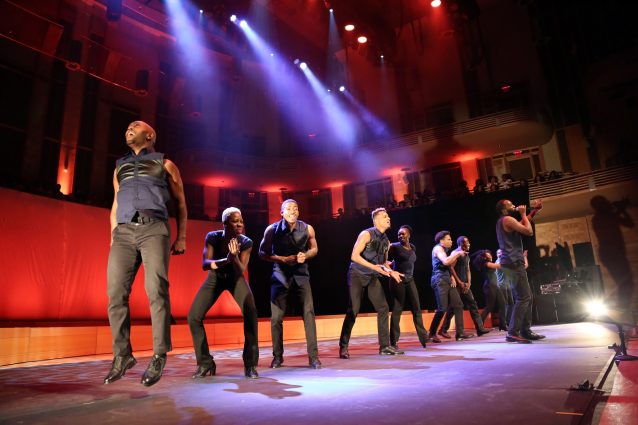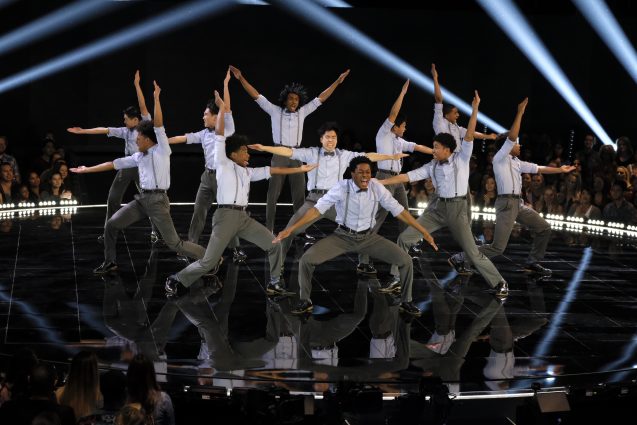“Atten – shun!” “Brothers and sisters!”
With the precision of a military drill team, the performers from Step Afrika! come to order with a grunt — backs ironing board straight, arms stiff, faces serious. Then they unleash a barrage of pounding beats: pinpoint stomps, claps, slaps and semaphoric arm gestures, as if they’re landing an airplane without the requisite flags and lights.
Step Afrika! changes the thermometer in any room where it performs, raising heart rates and temperatures merely by the driving forces of rhythmic stomps, claps and slaps. In tight succession, these well-honed dancers can take an audience from zero to 60 in a minute, max.
On a return visit to the Music Center at Strathmore on Sunday, Jan. 20, Washington, D.C.-based Step Afrika! launches its 25th anniversary year with a program of beloved favorites that show the distinctive percussive form engrained in early- and mid-20th-century African-American fraternity and sorority traditions.
“Although Stepping is rooted in the early 1900s, it had never truly been shared outside the fraternities and sororities” for decades, said the company’s visionary founder Brian Williams. “It could be witnessed, but not experienced directly.”
Step Afrika! is internationally renowned for helping to popularize the once-hidden art form called Stepping, which grew from sacred songs, chants and dances practiced by African American fraternities and sororities. Williams, a one-time marketing major at Howard University discovered Stepping when he pledged Alpha Phi Alpha. “We really didn’t consider it a dance,” he explained. “because of all these stereotypes about African Americans who love to dance. We were trying not to embrace that.” It was a way to connect, forge bonds, compete on the Yard and at Step shows on campus. But it was not considered entertainment or art.

It wasn’t until a post-college trip to Lesotho and South Africa, where Williams glimpsed a young boy practicing a similar percussive boot-slapping dance that he had his light bulb moment: “I was just shocked,” he said, “because it reminded me so much of Stepping.” He asked his marketing students about what he saw, and they taught him the dance. That simple exchange cemented connections between him and his students more so than his marketing lectures. “That was exciting,” Williams said and by the time he flew back home to Washington, the seed had been planted.
In 1994, Step Afrika! gave its first public performances in the District and at a dance festival Williams co-founded in South Africa. His aim was to build a company that merged these two percussive dance forms – traditional African gumboots and Stepping. He has been innovating with both forms ever since.
Today, 25 years on, the company has evolved from an earnest group of fraternity brothers into a fully professional arts organization that provides educational and engagement programs at home and on extensive tours around the country; serves as Washington, D.C.’s cultural ambassador; and tours and teaches around the world from Croatia to Chile, Jordan, Israel and beyond, on State Department-sponsored cultural exchange visits.
The Strathmore program is a retrospective of some of the company’s most beloved – and infectious – works, including the spiritual-infused “Wade Suite,” which the company terms its percussive “Revelations” — a nod to African American choreographic genius Alvin Ailey’s popular modern dance work. Another audience favorite, “Umngane” (oom-gah-ney), which means friend in Zulu, pays tribute to Step Afrika!’s co-founder, the late Mbuyiselwa “Jackie” Semela. The piece incorporates modern, West African and traditional Zulu dances, and Semela’s choreography explores the bonds of friendship, hearkening back to the company’s founding principles.

The performance also pays homage to the past in a tribute to late President Nelson Mandela on the 25th anniversary of his historic election, while also looking to the future, with an appearance by Dem’ Raider Boyz Step Squad, the dynamic step team from Eleanor Roosevelt High School in Prince George’s County. These young men gained notoriety from their appearance last summer on NBC’s “World of Dance.” “They’re awesome,” Williams said, “They’re taking Stepping to places that we’re not even going. They represent traditional Stepping as it exists now, not just in college frats and sororities, but in the elementary, middle and high schools and churches across the country.”
Williams credits the 1988 Spike Lee film “School Daze” for shedding light on this insular art form and giving him permission and inspiration to grow his seedling of an idea into a mature entity. “After [Lee’s film], you started to see step teams sprouting up around the country, in high schools, churches and then on television,” he said. These days you can find Stepping Off-Broadway in “Stomp,” on Broadway in “Choir Boys,” in Las Vegas at Cirque du Soleil shows and at Paris haute couture fashion shows. But Step Afrika! took Stepping to traditional theaters and concert halls prior to these developments.
Even today, no one else has taken Stepping to the concert stage with the care, vision and artistry that Step Afrika! has, crafting full-evening works that showcase the art form while honoring and honing its connections to traditional African dance and to America’s indigenous forms: tap and hip hop.
“The legacy of Step Afrika! has been in promoting Stepping as an African American art form,” said Janice Ferebee, an author, speaker and supporter of the troupe. “What started as a way of unifying particular groups – fraternities and sororities – in private has now turned into public entertainment.”
Ferebee, an Alpha Kappa Alpha soror, will lead a pre-show discussion at Strathmore at 3:30 p.m. Sunday. She hopes audiences listen for call-and-response chants and body percussion, note the performers’ camaraderie and how the rhythms and syncopations become a way to bring audiences together, joining in with claps and chants. One thing is for sure, Williams wants people to know that this is not a typical Strathmore concert.
As Ferebee said, “Be ready to make some noise.”
Step Afrika! 25th Anniversary Celebration will begin at 4 p.m. Sunday, Jan. 20, at the Music Center at Strathmore, 5301 Tuckerman Lane, North Bethesda. The pre-concert panel is set for 3:30 p.m. in the Mansion, 10701 Rockville Pike. For tickets, ranging from $35 to $75, visit www.strathmore.org or call 301-581-5100.